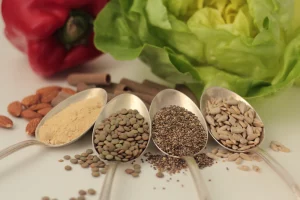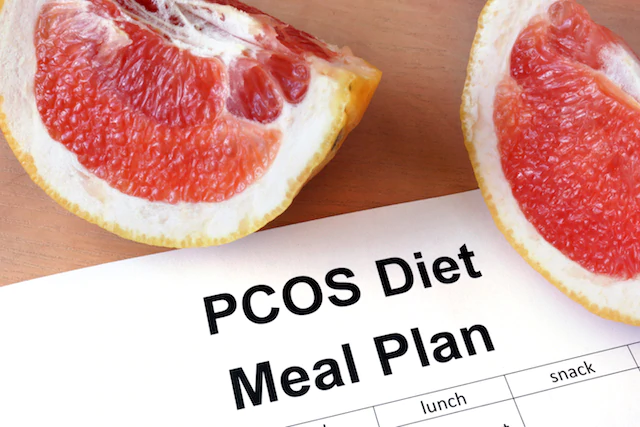The exact cause of PCOS remains unknown however it is thought to be a result of the interaction between genes and the environment.
Table of Contents
Why diet is important
Eating the right type of foods can help to improve insulin resistance and reduce the risk of developing long term implications linked with PCOS such as impaired glucose tolerance, type 2 diabetes and heart disease.
Based on the current research, studies are yet to reveal any significant benefits of one type of diet over another. However, what the research does reveal is that a diet comprised of good-quality carbohydrates of low glycaemic index and limited in saturated fat has been beneficial for those with PCOS. Also, switching from three big meals a day for smaller, regular meals and snacks every few hours or so has been shown to reduce large rises in blood glucose and insulin levels.
It’s important to note that the total exclusion of certain foods and food groups such as dairy and gluten is not necessary for those with PCOS.
By establishing healthy eating habits, this also assists with weight loss which has been proved to restore ovulation, increase fertility and improve many symptoms of PCOS.

Other lifestyle factors to consider
Although diet is an important contributor in managing PCOS, other lifestyle factors should be taken into consideration as well!
Exercise has been proven to have a significant impact on PCOS symptoms as well as improving blood glucose and insulin levels.
Maintaining a healthy weight is important as PCOS can cause our metabolism to slow down resulting in difficulties with losing weight. Studies have also revealed that losing a relatively small amount of weight (5-10%) can improve many of the symptoms of PCOS.
Stress, poor sleep quality and smoking have also been linked to insulin resistance. Therefore reducing stress levels, smoking and developing regular sleep patterns can help maximise PCOS management.
Our Dietitian’s Top Nutrition Tips:
- Make the switch to whole grain options which are high in fibre and are low in GI (i.e wholemeal and wholegrain bread/wraps, oats, barley and cracked wheat)
- Increase your vegetable intake! A great tip is to fill half your plate with a variety of different coloured vegetables for lunch and dinner.
- Choose healthy snack options such as fruit, a small handful of unsalted nuts, cheese & crackers, veggie sticks with dips like hummus or salsa, or a tub of Greek yoghurt.
- Reduce your intake of saturated fats by choosing leaner cuts of meats, low-fat dairy products and reducing your intake of take out meals.
By Annalise Farah, Accredited Practicing Dietitian (APD) – BMedSc & MND
If you have any questions regarding this article or would like to know more, feel free to send me an email or contact me through Instagram!
[email protected]
@annalise.equteam

